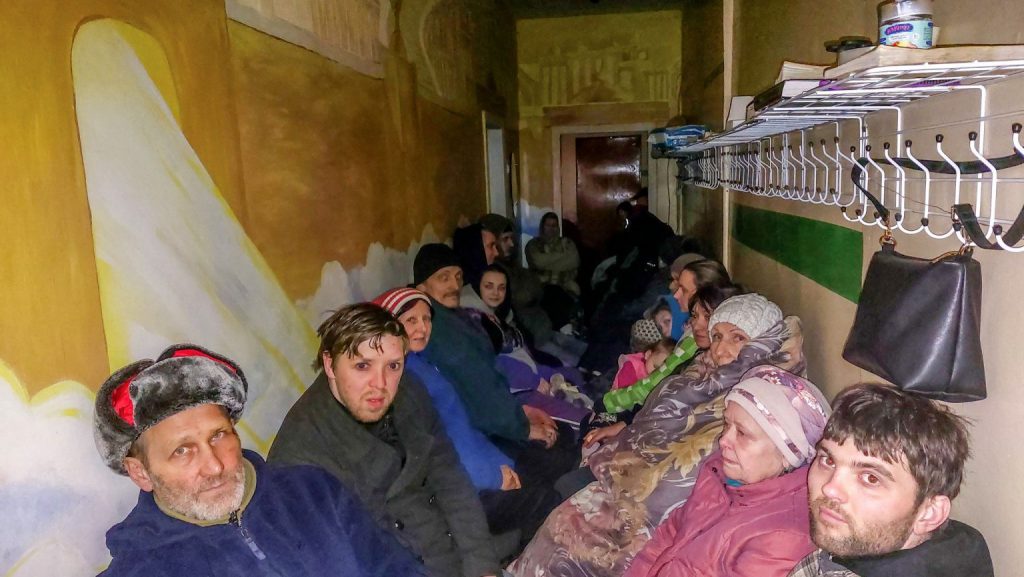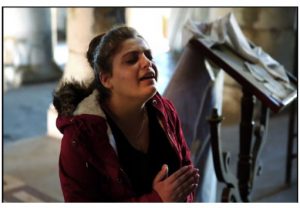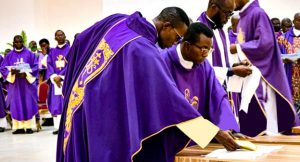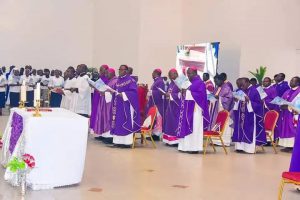Some of us have heard of this 1990 book Why Catholics Can’t Sing?. The author, an American professional Catholic musician, suggests that, in spite of the fact that our Catholic musical tradition is our greatest artistic treasure, most parishes have poor music and most are disengaged. 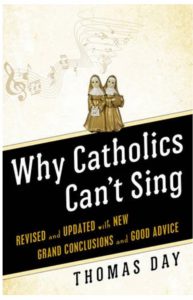
We all see it: Go to any church in North America and it’s accepted that most Catholics don’t sing. The author is saddened also by the fact that this is connected to a loss of faith in God and the Eucharist.
Some of the typical reasons offered are poorly chosen music and poor choirs. I get it: I’ve been to some Masses where the music is brutal, and I remember one monk at the Abbey (God rest his soul)—it was better when he didn’t sing! But, beyond these situations, are there other reasons? On your way home, could you talk about this: Why don’t we sing? As I reflected, I realized that I still have a problem with being moody, which is why I don’t feel like singing sometimes.
Today, as we celebrate the greatest gift of Jesus in the Eucharist, the gift that makes Catholicism so distinctive, the gift for which is worth dying, my proposal today is that the reason we don’t sing is not out there, but in here [the heart]. The Eucharist is so beautiful that it inspires gratitude, hope, love, and joy. Consequently, the natural response is singing.
Last Palm Sunday, we said we were going to talk about this topic. Today is perfect because the Gospel is an excerpt of the Palm Sunday Passion Narrative: “On the first day of Unleavened Bread, when the Passover lamb is sacrificed, the disciples said to Jesus, ‘Where do you want us to go and make the preparations for you to eat the Passover?’ So he sent two of his disciples, saying to them, ‘Go into the city, and a man carrying a jar of water will meet you; follow him, and wherever he enters, say to the owner of the house, “The Teacher asks, ‘Where is my guest room where I may eat the Passover with my disciples?’”’” (Mk 14:12-14). Dr. Tim Gray points out that Jesus is using code here. (Please watch from 20:05 – 21:30.) He knows the Pharisees and chief priests are trying to kill Him, so He has to be careful about revealing His location, because He can’t die yet; He has to make sure that He institutes the Eucharist before He’s captured. The Eucharist is fundamental to His mission—He can’t die until He’s given us the Mass. So, He tells Sts. Peter and John to follow a man who’s carrying water. At that time, women would carry the water, so finding a man carrying water would be easier for the disciples to spot.
Furthermore, at the end of the Last Supper, it says, “When they had sung the hymn, they went out to the Mount of Olives” (Mk 14:26). This is the only recorded time Jesus sang, and what’s remarkable is that He does so between Judas’ leaving the supper to betray Him and the prediction of St. Peter’s denials. This tells us something about Jesus’ Heart. In the midst of a terrible situation, He gives His friends the Eucharist and sings!
He probably sang the traditional psalms at the end of Passover, Psalms 113 to 118, which praise the fact that God can redeem all things and rescue us from slavery!
So, here’s the first reason why singing during Mass is good: It’s an expression of faith and strengthens our faith. Sometimes, when we’re hurting and discouraged, we don’t feel like singing, but that’s a trap. Praising God will actually help us. As we’ve discussed in the last few weeks, we need to learn to resist our discouraging thoughts and feelings.
The second reason is that singing takes the focus off ourselves and puts it onto God. It occurred to me that when I don’t sing, I’m being selfish. I need to focus more on Him, less on me.
The third reason is that Jesus’ example teaches that singing isn’t primarily about how we feel, but about what God deserves.
We talked about in December the martyrdom of 26 Japanese Catholics in 1597, some of whom sang while on the cross. Singing was an expression of their faith, it focused them on God, and it’s what God deserved.
It’s not primarily about the music we sing or how good the choir is. It’s about God. The truth that alerted me to this was something I read in a book: It simply said, “Disciples Sing” (Fr. Michael White & Tom Corcoran, Rebuilt, 99). It made the case based on what Pope Benedict XVI said: The word ‘sing’ or ‘song’ is one of the most commonly used words in the Bible, occurring 309 times in the Old Testament and 36 in the New (The Spirit of the Liturgy, 136). “When man comes into contact with God, mere speech is not enough. Areas of his existence are awakened that spontaneously turn into song.” When we encounter Jesus’ goodness and make Him the center of our lives, we sing!
As we do every year on Corpus Christi, let’s quickly review how we show our respect for the Eucharist, which we’re already doing very well. 1) Receive in a state of grace. E.g. If we miss Mass on Sunday through our own fault, we can’t take Communion until we go to Confession. 2) Respect the one-hour fast: No food or drinks, except water or medicine one hour before Communion. 3) If we receive the Eucharist on the hand, let’s make a throne for the King; it’s the most sacred moment. I’ve always encouraged everyone to receive on the tongue, not because it’s holier (it isn’t), but because it’s a special reminder that this is special food. We don’t receive any other food this way, so this reminds us that this is unique. In addition, the Eucharist should be consumed immediately; we don’t stand up, walk away, and then consume. This is why we have the ushers acting as Eucharistic guards at the Communion rail: We don’t want to commit sacrilege.
Today, let’s add a fourth way to show respect: Sing! There’s no pressure, but it’s our opportunity to say to Jesus: ‘When You were betrayed, You sang to God the Father. Now let me sing to You, even when I don’t feel like it.’
Now, it’s true that, sometimes we praise God by listening to others sing—that’s good, as long as we’re not resisting singing. And, if we’re aware that we don’t sing well or on key, then we don’t have to sing loudly, because we don’t want to distract people. However, these are rare situations.
The area in which we want to grow is what we prayed before the start of Mass: “Most merciful Lord, the Eucharist of your Son rejoices my heart. Make me ready to sing a constant hymn to your glory. Then I shall find a home among your saints for all eternity” (Fr. Romanus Cessario OP, Praying with St. Mark’s Gospel, ed. Fr. Peter John Cameron OP, 315).
Again, if you can, as you go home, please discuss: Why don’t I sing? And, what is Jesus asking me to do? How can I praise Him in song?
In Mariupol, Ukraine, for 51 days, some Christians took refuge during shelling, and said, “We would sing louder than the shelling.”
In Iraq, in 2016, after their church is destroyed, Fr. Bashar returns and some of his choir sings.
- Photos from: live-production.wcms.abc-cdn.net.au
Two years ago, in Owo, Nigeria, after over 40 Catholics were killed at Mass, during their funeral, Bishop Badejo, in his homily, mentioned how they can still sing because of Jesus.
- Photos from: nigeriacatholicnetwork.com
So, why don’t Catholics sing? It’s not because of the music or our ability; it’s because of our hearts. We shouldn’t focus on ourselves but on Jesus in the Eucharist.


